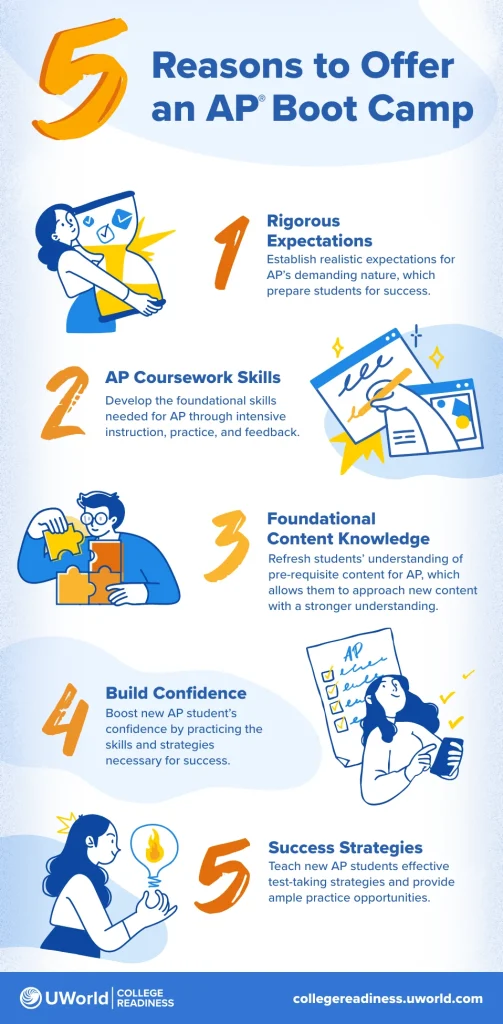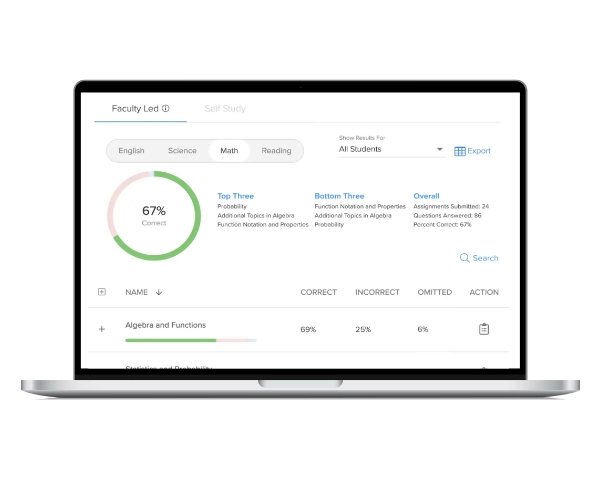What comes to mind when you hear the words "boot camp"? Many people picture a group of camouflaged military recruits performing a slew of grueling physical tasks, like timed push ups and rigorous obstacle courses. According to the United States Department of Defense, a boot camp, or basic training, "gives service members the basic tools necessary to perform the roles that will be assigned to them.”1
And in a way, that’s exactly what educators can provide for students who want to excel in AP® courses. School administrators might not set up a military training camp with drill sergeants and survival skills, but they can offer a summer opportunity for new AP students to gain the basic tools necessary to perform well in advanced courses. They can offer an AP summer boot camp.
Why Offer a AP Summer Boot Camp?
There are many reasons why high school administrators should consider offering AP boot camp activities for students during the summer months. Advanced placement courses are exceptionally rigorous, and students who take them for the first time often come in without a clear understanding of the level of work required and expected. Sometimes they end up feeling overwhelmed, struggling to simultaneously develop the skills and strategies necessary to thrive both in class and on the AP exam. AP summer camps can offer students new to AP courses a number of benefits, which can in turn benefit the school with high AP passing rates.2
Sets realistic expectations for course rigor
Attending an AP boot camp provides a preview of the challenging content and fast pace of AP classes, which can be overwhelming for many high school students–particularly those new to the program. This kind of opportunity teaches students to take proper notes, builds confidence, and reinforces their ability to think critically and creatively through challenging content. This, in turn, will better prepare them for the intensity of advanced coursework, ultimately building the foundational skills and habits needed for success.
Teach needed skills for specific AP courses
AP boot camps provide intensive instruction, practice, and feedback on the key concepts and strategies relevant to the subject, helping students better understand and retain the course material. By focusing on the fundamental skills necessary for success in the course (such as close reading in AP Lang or note-taking in general), students can build a strong foundation and develop the confidence needed to tackle more advanced topics. This approach is especially helpful for students who may be struggling with certain concepts or who need additional support to fully grasp the material.
Reviews foundational pre-requisite content
For many students, prerequisite content can be a stumbling block when it comes to succeeding in an AP course. That's where AP boot camp activities can be particularly helpful. These programs can help students refresh their understanding of pre-requisite content, allowing them to approach new material with a stronger contextual understanding and a more solid foundation for learning. This approach is especially valuable for science and math courses, where content spirals, and for students who may not have had a chance to fully grasp the prerequisite content in earlier courses.
Builds confidence in new AP students
Starting an AP course can be daunting, especially for students who are new to the program. However, attending an AP boot camp can provide students with the opportunity to practice the skills and strategies needed for success, which can boost their confidence and help them feel prepared for the challenges ahead. For example, some students have the drive needed to succeed in AP courses, but the content might not come easily to them without first learning how to take notes, or think critically about a complicated reading passage. By learning these skillsets in a relaxed summer environment, those students can begin their AP courses feeling more confident, equipped with the tools and knowledge necessary to succeed.
Provides students with AP course and exam strategies
Attending an AP boot camp can be an effective way for new AP students to learn effective test-taking strategies and gain ample practice opportunities. These programs focus on the specific skills and strategies required to perform well on AP exams, such as time management, question interpretation, and content review. Students can gain valuable feedback from instructors, practice with simulated exam questions, and learn tips and techniques to maximize their scores. By gaining this specialized knowledge and skill set, students can approach AP exams with confidence, knowing they have the tools and preparation necessary to excel.
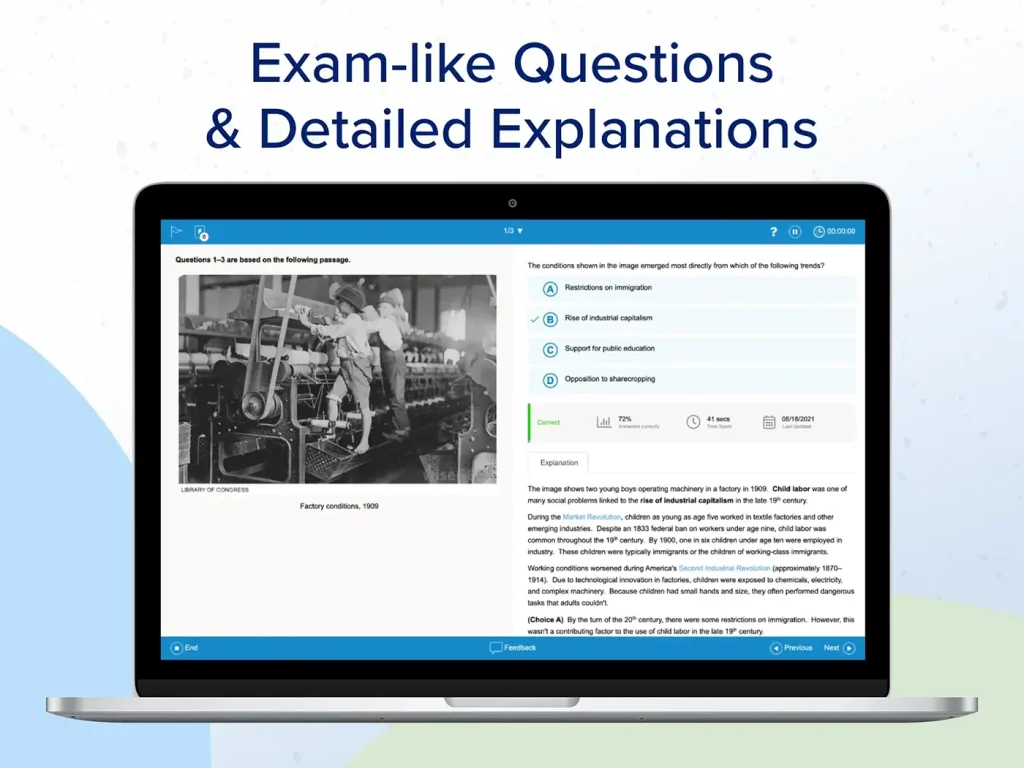
How to Set Up an AP Summer Boot Camp
Once an administrator has decided to provide an AP summer boot camp at their school, they’ll need to take the necessary steps to get it going. Not only will they need to gauge and build student interest and create student rosters, but they’ll also need to get their top AP teachers on-board. Many AP teachers sign up to score AP exams over the summer months, so finding available instructors who have the necessary credentials and creative drive to successfully engage new AP students may take time. Boot camps can last anywhere from 3-4 days, or 2-3 weeks. These camps are meant to “pack a punch” in a short amount of time, getting students excited about and prepared to take AP courses in the fall.
Step 1: Create a list of potentially interested students
It goes without saying that an AP summer camp can’t happen without student interest and enrollment. Frequently, teachers in the grade level leading up to an AP course will have student recommendations of their own. After all, working in related prerequisite courses allows them to see which students may be highly motivated to work hard in an AP course, but might still struggle without a solid foundation of skill-sets and strategies. School guidance counselors may also have a list of student recommendations since they speak and work with students regularly, often understanding their long-term academic and career goals.
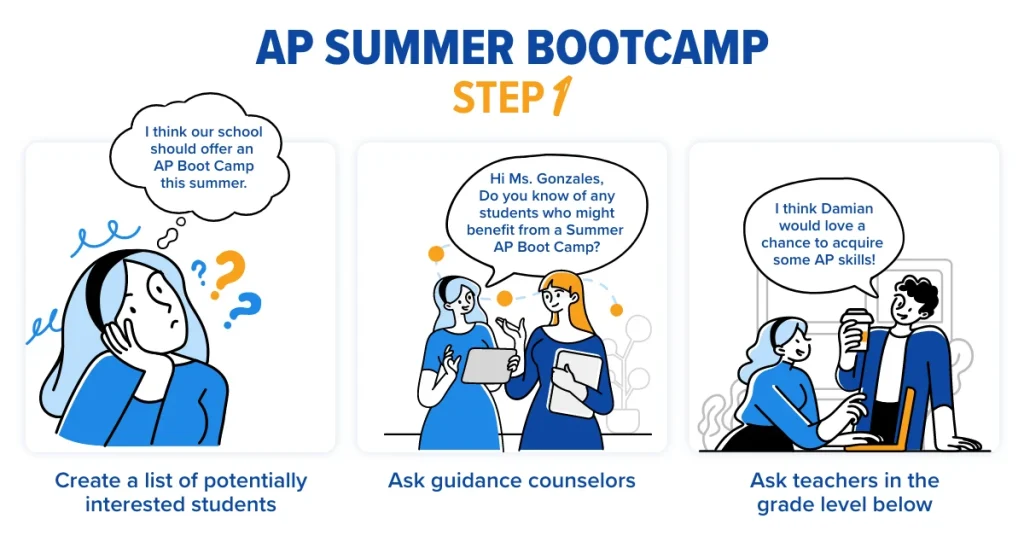
Enrollment slots will most likely need to be limited due to logistical constraints, so before sending out information to the entire school community, principals should ask these teachers and guidance counselors for their input and student short-lists. Once they have an idea of students who would greatly benefit from attending the boot camp, they can begin the process of spreading the news about it.
Step 2: Spread the news
Once a principal has spoken with their teachers and counselors about a potential short-list of students who may be a good fit for the AP summer boot camp, it’s time to start spreading the news about it. Flyers should be posted in school hallways so potentially interested students can hear about it and sign up. Emails should be sent to parents and caregivers, announcements should be made at PTA meetings, the school’s website and social media pages should be updated with the AP summer camp information, and teachers and counselors should speak to the individual students they believe would really benefit from the program.
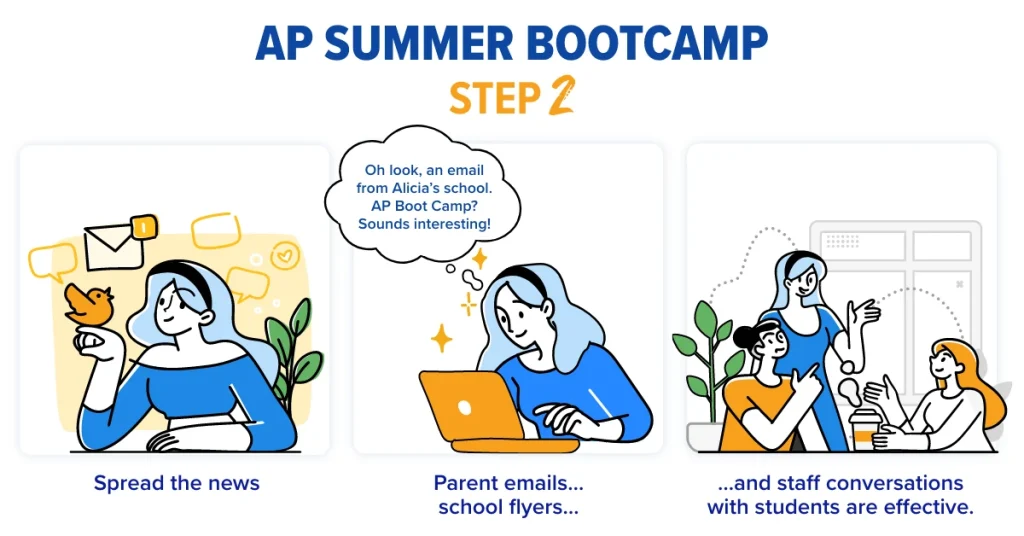
In general, registration should be on a first-come first-served basis, although the boot camp may already have spots reserved from the short list of students in step one. Once an administrator has let their school’s community of students and parents know about the AP summer boot camp and registration has closed, it’s time to move on to the final step of the process.
Step 3: Finalize students and program logistics
Once registration for the AP summer boot camp is complete, an administrator will need to finalize student lists for the AP teachers leading each course subject’s session. Then, while administrators are working out the day-to-day logistics of the boot camp (Will it be fully on-campus or partially online? What will the session schedule look like for each day? etc.), the AP instructors teaching the sessions will need to plan for them.
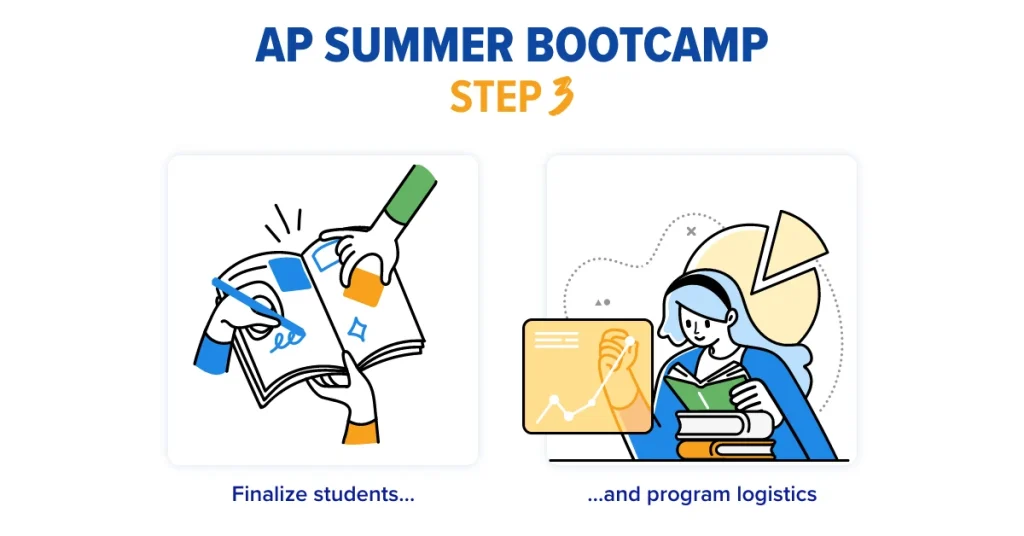
This step is perhaps the most complex, and the majority of logistical planning will happen between the time the school year ends and the AP summer boot camp begins. Because of this, it’s a good idea to schedule the boot camp a few weeks after the school year ends. This will give teachers and administrators time to get everything ready, and it will also give students a much-needed summer break before they begin their boot camp work.

Curriculum and Activities
The purpose of these summer sessions is to help students develop the skill-sets and strategies they need to succeed in AP courses. Although teachers may review foundational content concepts students will be expected to know at the start of an AP course, instructors will not teach new course content that will be covered in the actual AP subject. This makes sense, as doing so would place students who could not attend an AP summer boot camp session at a disadvantage.
Depending on their course subject, AP summer camp teachers may work with students on foundational math and science skills, close reading of documents, thinking outside the box, and implementing content knowledge into practice. Annotation and writing skills are especially important to learn for most AP subjects.
Language Arts
- Close reading, analysis, and interpretation of a text
- Researching and organizing information from a variety of sources
- Writing: drafting and revising
- Evaluating a source of information
- Writing an argument that is well-developed and evidence-base
Math
- Fractions, decimals/percentages, and linear equations
- Logarithms
- Data displays and scatter plots
- Mean, median, and mode
- Basic concepts of probability
Science
- Lab safety
- Scientific Method
- Data observation and measurement
- Communication and classification
- Inference and prediction
Social Sciences
- Analyzing primary & secondary sources: content, sourcing, and interpretation
- Historical connections: comparison, contextualization, and synthesis
- Chronological reasoning: causation, patterns, change, and periodization
- Historical argumentation
- Writing document-based question responses
* Information3-7
Making Your Boot Camp a Success
As is the case with any academic workshop or camp, strategic planning is imperative to make everything run smoothly and make it a success. AP summer boot camps are no different. As mentioned above, successfully setting one up begins long before the spring semester of the school year has ended. It’s a good idea to plan all of the logistics for it several weeks out, so as to give teachers, students, and caregivers plenty of time to make arrangements for the summer session. And before that, administrators should give themselves plenty of time to actually select the right teachers and students for the boot camp.
AP summer sessions are short—typically ranging in length from a couple days to a couple weeks—so the teachers who are chosen for them should be extremely knowledgeable in their subject area, as well as creative and engaging. These educators have a short amount of time to provide their students with the basic skills and foundational knowledge they need to succeed in their AP courses during the school year. Needless to say, there isn’t a lot of wiggle room for “figuring things out” as they go along, or for slowly building confidence and connection with their students.

Additionally, making sure boot camp instructors have a thorough understanding of why so many students fail to complete AP courses and often drop them within the first few weeks of the semester can also help AP boot camp educators know how to better approach these summer sessions. Students who drop their AP courses frequently do so early on in the semester because they struggle with the rigor of the content and how to study it for a stronger understanding. Encouraging AP boot camp teachers to provide students with opportunities to practice the types of rigorous questions they’ll see in class and on the exam, while also gaining a headstart on the foundational concepts they’ll encounter during the first few weeks of their AP course, can result in both a successful boot camp and a successful school year. Offering students practice tools, such as UWorld’s Learning Tools for AP Courses, can do precisely that.
As far as students go, those who participate in these boot camps should be highly motivated. The ideal student may not get perfect scores on every assignment or test, but they work hard and want to succeed in their AP courses. This ideal student will benefit from the chance to become accustomed to the challenging questions seen in AP courses if given access to practice tools, such as those provided by UWorld. They will see incorrect answers as an opportunity to learn from the answer explanations without giving up on the content. Students who easily get perfect grades already, or who rarely put in a lot of effort into their school work, are not ideal for an AP summer boot camp because they may end up taking up a spot that could otherwise be given to a student ready to make progress.
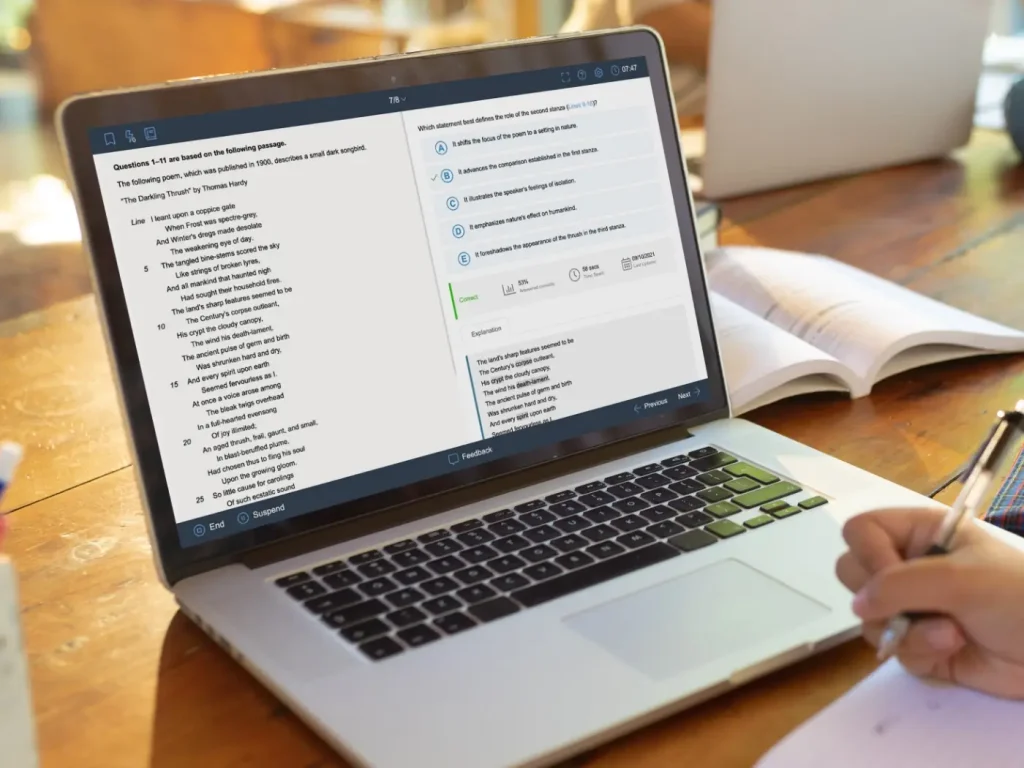
Key Takeaways
AP summer boot camps offer new AP students the opportunity to develop foundational skills and strategies for effectively learning advanced course material. These summer sessions allow students to approach AP classes and exams with confidence during the school year. With careful planning, organization, and dedicated teachers and students, an AP summer boot camp can be a tremendous success.
Learn more about how we support AP educators who strive to make a difference in the lives of their students with our Learning Tools for AP Courses.
References
- Boot Camp. Boot Camp - Today's Military. (n.d.). Retrieved April 26, 2023, from https://www.todaysmilitary.com/joining-eligibility/boot-camp
- Supplemental supports for AP students. Supplemental Supports for AP Students – AP Central | College Board. (n.d.). Retrieved May 1, 2023, from https://apcentral.collegeboard.org/about-ap/start-expand-ap-program/expand-access/spotlight-on-success/student-support
- AP English language and composition. AP English Language and Composition – AP Students | College Board. (n.d.). Retrieved May 1, 2023, from https://apstudents.collegeboard.org/courses/ap-english-language-and-composition
- Prepare for AP calculus AB - Summer math boot camp: Small online class for ages 14-18. Outschool. (n.d.). Retrieved May 1, 2023, from https://outschool.com/classes/prepare-for-ap-calculus-ab-summer-math-boot-camp-0Am49x6O
- Prepare for AP statistics - summer math boot camp: Small online class for ages 14-18. Outschool. (n.d.). Retrieved May 1, 2023, from https://outschool.com/classes/prepare-for-ap-statistics-summer-math-boot-camp-3saAARlY
- Teaching the science process skills - Longwood University. (n.d.). Retrieved May 1, 2023, from https://www.longwood.edu/cleanva/images/sec6.processskills.pdf
- LaMotte, M., & Team, T. A. (2022, March 1). The 5 most important historical thinking skills for the AP® US history test. Albert Resources. Retrieved May 1, 2023, from https://www.albert.io/blog/5-most-important-historical-thinking-skills-for-the-ap-us-history-test/
- Broadening access to advanced placement. (n.d.). Retrieved May 1, 2023, from https://apcentral.collegeboard.org/media/pdf/broadening-access-to-ap.pdf

